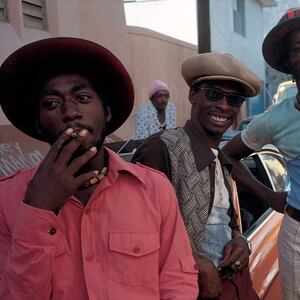The elegantly attired, 4-foot-11-inch great grandmother might not have been easily identifiable as a music mogul to the industry insiders attending the American Association of Independent Music Awards at Manhattan’s Highline Ballroom on that day in the summer of 2015. Then Patricia Chin, co-founder of reggae label VP Records, stepped up to the stage to receive the group’s Lifetime Achievement Award, the first woman ever to have done so. “As I look out at the audience tonight, I imagine that many of you may be asking yourselves, ‘who is this Chinese lady with this big Jamaican accent, and what is VP Records?’” said Miss Pat, (as she is affectionately known) in her acceptance speech, to roaring applause. “In large part the story of VP Records is about a woman working behind the scenes and her journey for the past 50 years in the reggae music industry.”
VP Records, established in Queens, New York, in 1979, with additional offices in Kingston, London, Miami, Rio de Janeiro, and Tokyo, is the world’s largest independent label, distributor, and publisher of reggae and dancehall music, controlling more than 25,000 song titles. In her forthcoming glossy coffee table memoir, Pat Chin: Miss Pat My Reggae Music Journey, Miss Pat tells VP’s story, which is inextricably tied to the development of Jamaica’s recording industry and the birth of ska, rocksteady, and reggae. Miss Pat offers historical anecdotes about recording sessions with Bob Marley and Lee “Scratch” Perry when both were seeking greater fortunes. Accolades for Miss Pat are found throughout, including one from hip-hop godfather DJ Kool Herc, who says: “What Berry Gordy was to Motown, Patricia Chin is to VP Records and the reggae industry.”

In the book’s most compelling passages, Miss Pat courageously details her life’s greatest challenges: the death of her infant son; fleeing Jamaica’s explosive politics of the 1970s, struggling to acclimate to another society; defying the sexist and racist attitudes she encountered as a non-white female working in the music business in New York City; becoming educated about alcoholism to help her embattled husband, VP Records co-founder, Vincent “Randy” Chin, who passed away in 2003; coping with the unsolved murder of her grandson, VP A&R Joel Chin, in 2011. “The process of writing my book was freeing,” Miss Pat told The Daily Beast in an early December interview via Zoom. “I wanted my book to be truthful, entertaining and interesting so I couldn’t leave out personal details, I want people to get to know me better instead of seeing me as just a music person.”
The reggae matriarch, now 83, was born Dorothy Patricia Williams on Sept. 20, 1937; her maternal and paternal grandparents migrated to Jamaica, respectively, from China and India, seeking better lives. “It was hard to survive where they came from, so they took a chance on Jamaica,” recalled Miss Pat, who was raised in a single room house in Kingston’s Greenwich Farm community. “Despite our lack of material comforts, there was never time for complaints. My mother shared stories about her hardworking shopkeeper parents and the innovative tricks they used to do business with their customers, despite the language barrier,” she writes. Miss Pat’s father wanted her to work in a bank, but, inspired by her idol Mother Teresa, she studied nursing at Kingston’s University of the West Indies. Inheriting her mother’s rebellious spirit, Miss Pat relished the freedom of living on campus, where she was often visited by a handsome young man, Vincent Chin, much to her father’s disapproval. “Known for skipping school and smoking marijuana, Vincent was your typical bad boy, the kind of suitor no parent wanted for their daughter,” Miss Pat writes. “To make it worse, he had already fathered a child (Clive) who was a toddler. My father saw my suitor for what he was: trouble.”
On March 15, 1957, Miss Pat, then 19 years old, left school and married Vincent, two weeks before giving birth to their son, Gregory. He died from meningitis on his first birthday. “For the sake of my well-being,” penned Miss Pat, “I was never told where my infant son was laid to rest.” Vincent and Pat’s son Christopher was born four months later.
Vincent got a job, stocking jukeboxes across the island with new 7” records; Miss Pat believed that the older discs could be sold directly to the public. In 1959 they set up a shop within a small grocery store selling the used records. They called their business Randy’s Record Mart, after Randy Wood, owner of WHIN AM, a jazz, R&B, and country music station in Tennessee that Vincent faithfully listened to on his shortwave radio. In 1961 Vincent and Miss Pat moved to an 8-foot by 10-foot space within a Chinese restaurant located at 17 North Parade, a bustling area of downtown Kingston, next to a central bus route; they set up a small speaker box outside playing music, which brought in customers. Sales increased and with a loan from Miss Pat’s father, the couple eventually bought out the Chinese restaurant and purchased the building. Shortly thereafter, Vincent and Pat acquired the building next door and began building a recording studio.

The opening of Studio 17 upstairs from Randy’s Record Mart coincided with the development of Jamaica’s first popular music form, ska, which led to a proliferation in recordings that Studio 17 helped expedite. “In those days, there was no one stop studio where one could complete their work, start to finish. You had to go to one place to do a recording, another to do the mastering. With more and more artists and producers emerging, and with the existing studios charging high fees, we designed the studio to be a full house production so that we could be completely independent,” writes Miss Pat, who would play the test pressings of recordings in the shop to gauge the customers’ interest and then choose which songs they would press in bulk for sale.
Vincent Chin started producing his own records and one of his biggest hits arrived in 1962, the year of Jamaica’s independence from England. “Independent Jamaica” didn’t incorporate the island’s indigenous ska beat, it was a calypso sung by Trinidadian-born, Kingston-based Lord Creator; nonetheless, it became an anthem for the new nation’s optimism, released on Randy’s Creative Calypso label.
Miss Pat stocked the shop with at least one record by every artist she knew of and asked aspiring artists and producers to leave their records on consignment, which laid the foundation for Randy’s wholesale division. Music lovers flocked to Randy’s to hear the latest records while producers sought out the singers and musicians that would frequent an adjacent alley called Idler’s Rest (“the unofficial epicenter of Jamaican music,” Miss Pat writes) to record tracks at Studio 17. Many icons of Jamaican music recorded there, including singers Gregory Isaacs, Dennis Brown and Alton Ellis, harmony trios The Wailers and The Maytals and seminal ska outfit, The Skatalites.
Several classic roots reggae albums were recorded at Studio 17, including The Wailers’ Soul Rebel, Burning Spear’s Marcus Garvey, Peter Tosh’s Equal Rights and melodica master Augustus Pablo’s debut This Is Augustus Pablo, the latter produced by Pablo’s school mate, Vincent’s son Clive.
Clive also produced Pablo’s (still) influential single, “Java” and Studio 17’s first international hit, Carl Malcolm’s “Fattie Bum-Bum,” which reached No. 8 on the U.K. singles chart. The late American singer Johnny Nash, reportedly the first non-Jamaican to record rocksteady/reggae on the island, was so impressed by Studio 17, he booked the facility for three consecutive months. Miss Pat attributes Studio 17’s success to Vincent’s amiable personality. “He loved everyone regardless of how poor they were; many musicians didn’t even have shoes on their feet, but Vincent would bring them into the studio, encourage them. Everything was experimentation, we didn’t have a reggae culture yet, it started from that time,” notes Miss Pat.
Due to escalating political violence in Jamaica throughout the 1970s, Vincent and Pat migrated to the U.S. “At that time (under Prime Minister Michael Manley’s socialist government) if you owned a business, you had a little more money than the others and with the unrest and riots going on, we felt very uncomfortable, and worried about the safety of our children,” Miss Pat acknowledged. They chose New York City because Vincent’s brother was living in Brooklyn, where he established Chin Randy’s Records. Vincent and his sons Clive and Christopher landed at New York City’s JFK airport in the summer of 1977. Miss Pat remained in Kingston with her two younger children, Vincent (a.k.a. Randy) Jr. and Angela; they joined the family in New York City the following year.
Vincent and Pat started their new endeavor by renting a small storefront near the elevated train tracks along Queens’ Jamaica Avenue, from which they supplied reggae records to a few outlets. When the Jamaican government began clamping down on exports, Vincent and Pat started pressing their own records in New York; as their sales increased, they purchased a building at 170-21 Jamaica Ave in 1979 from another wholesale record business owner, Sam Kleinholt. The Chins named their reggae wholesale/retail store VP Records, the initials of Vincent and Pat’s first names. They hired Kleinholt’s secretary, Rhoda Bernstein, who worked with VP for 15 years, until her death. “She was a godsend,” Miss Pat writes, “she taught us everything she thought would help us adjust; to say she made our transition into New York life easier is an understatement.”
Not all New Yorkers were as welcoming. Miss Pat remembers wanting to purchase a home in the (then) predominantly white community of Jamaica Estates, about two miles from VP Records; her real estate broker discouraged her, without explanation. “Years after, I realized I couldn’t buy there because we were of a different culture, there was a color barrier,” she notes, “he wanted to put me in another area where I would be more ‘comfortable.’” Miss Pat also recalled instances when VP customers called the store, got her on the line and asked to speak to a man instead. “They thought I didn’t know the music,” she reminisced. “I worked hard on my skills; we had so much music coming out every day, I had to know the name of the record, the singer, the producer, the rhythm track; I was like an encyclopedia, I knew everything about the music.”

As VP Records grew into a thriving one-stop shop covering all facets of Jamaican music, in 1990 the Chins purchased two large warehouses, one in Jamaica, Queens, the other in Miami. As the decade progressed, Jamaican dancehall reggae exploded in popularity as several of the genre’s superstars (including Shabba Ranks, Super Cat) signed to major record labels and impacted a wider American market. VP had distributed these artists’ records for years, so their familiarity with the music became an indispensable asset to the majors in furthering dancehall’s appeal. The Chins’ next move was establishing the VP Records label in 1993, the same year they launched their most successful annual reggae/dancehall compilation series, Reggae Gold.
VP Records’ 1999 release “Who Am I” by Beenie Man was a certified gold single. Even greater triumphs arrived with Sean Paul, who was signed to VP by Clive’s son Joel Chin, in 2000. VP entered into a partnership with Atlantic Records, propelled by Sean’s big hit “Gimme The Light.” Sean’s two-time platinum selling sophomore album Dutty Rock won a Grammy for Best Reggae Album. “That was the moment we took a deep gasp and realized, as we Jamaicans would say, ‘dis a nuh joke ting we a deal wid,’” writes Miss Pat.
Vincent, however, was uninspired by dancehall; he became depressed and was, according to Miss Pat, “mentally checking out of the business.” He struggled with alcoholism, which included several stays in rehab. Miss Pat writes that Vincent’s excessive drinking was linked to “a troubled spirit,” that she tied all the way back to his childhood, and “his parents’ mixed-race marriage. Vincent’s father was prominent in the Chinese Jamaican community, but he didn’t interact with his Black wife within that community. I believe this unspoken prejudice caused my husband to develop a deep sense of insecurity, resentment and sadness.”
Miss Pat recalls her mother enduring a similar dilemma, because her parents disapproved of their daughter’s marriage to an Indian man. “My grandparents made up with my father and mother, but it took them 12 years because 100 years ago, marrying outside of your (Chinese) culture was a no-no. But my parents were in love and survived all the barriers.” Miss Pat’s father was also an alcoholic and her mother tried to conceal that from Pat and her siblings, just as Miss Pat shielded her children from the truth. “Not being honest with my children is one of my biggest regrets, it’s the only thing I would do differently, if given the chance,” Miss Pat reveals.
Vincent and Pat’s son Randy, VP’s president, gave up his successful career in aeronautics to join the family business in 1995; Christopher is the company CEO and Angela runs the Florida warehouse/distribution center. Clive has intermittently worked with VP but has also pursued numerous independent projects. In December 2014 he filed a lawsuit against VP seeking $3 million, alleging the company licensed songs he wrote and recorded at Studio 17 without his permission; that lawsuit was quietly resolved.
In addition to the award at the Highline Ballroom, one of Miss Pat’s proudest moments was VP Records’ 25th anniversary concert at Manhattan’s Radio City Music Hall in 2004, headlined by various acts associated with the company over the years, including Beenie Man, Shaggy and Beres Hammond. “That was the first time I saw my name in lights and with all the people lining up to come in, I was overjoyed. For one night, reggae had taken over an iconic American landmark. If I didn’t know before that, that anything was possible, I knew it then,” she writes. In 2007 VP Records acquired its chief competitor, the U.K.’s Greensleeves Records, and their catalogue of 12,000 songs, to become the largest independent reggae company in the world. That imposing status is the crowning result of Miss Pat’s remarkable and still ongoing journey. “It took a while for this to sink in,” she pens. “When you’ve built something from the ground up, the memories of selling records in your 8’ x 10’ shop never quite leave you.”



